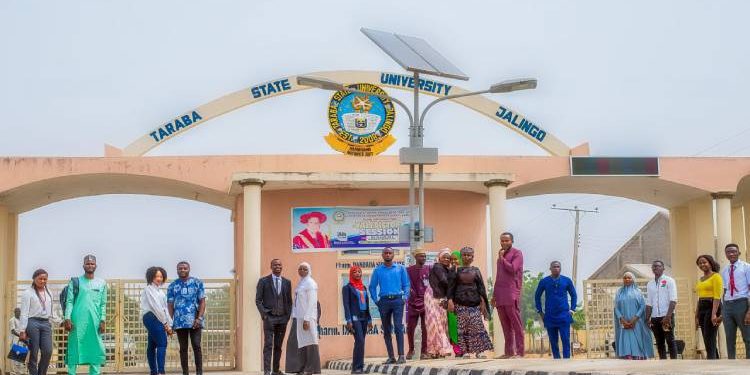On TSU’s Unending Strikes and Government’s Brutal Responses: A Call for Stakeholders’ Intervention
By Tordue Simon Targema
Taraba State University (TSU), Jalingo is, yet again, under lock and key as a result of industrial actions embarked upon by the Academic Staff Union of Universities (ASUU) on the 5th of December 2024, and all other labour unions in the University subsequently to press home germane issues that bother on effective running of the institution and welfare of its staff. Ordinarily, this would not have been a hopeless situation completely, as industrial actions could be resolved as soon as they start if well handled. But with the rather harsh and brutal response of the Taraba State government, a solution to the present strike is not in sight.

What are the issues in contention, by-the-way? ASUU-TSU outlined six key demands upon commencement of the strike as follows: (1) absence of pension scheme for staff of the University, (2) non-payment of four months’ salary backlog, (3) failure of the state government to constitute a Governing Council for efficient running of the University, (4) non-payment of accumulated Earned Academic Allowances, (5) repeated exclusion of the University from minimum wage implementations, and, (6) inadequate funding as provided by the Law establishing the University.
Simple as these sound, all diplomatic approaches by ASUU to prevail on the state government to address them have failed, leaving the Union with no option but to embark on strike. Sadly, the response of the state government clearly indicates that the strike will linger longer than expected.
A quick rundown on the major responses as highlighted by the Chairperson of ASUU-TSU Branch, Dr Mbave Joshua Garba thus far confirms this hunch: first was a statement from the Office of the Special Assistant (to the State Governor) on Media and Digital Communications, Mr. Emmanuel Bello requesting the Union to call off the strike immediately and return to the negotiation table, to which the Union queried: which negotiation table? The same “table” that government officials abandoned since June 2024, and have consistently evaded the Union’s advances for engagements?
Besides, the struggle at this point has passed the stage of “negotiations” but instead, requires appropriate actions on the part of government: do we need negotiation to enact a Governing Council for the University, implement a pension scheme, pay salary arrears/EAA, or implement the national minimum wage for the University? One thus wonders what exactly the SA wanted to negotiate with the Union again.
The second response as reported by the Chairperson came through the Commissioner of the then Ministry of Education, Dr. Augustina Godwin, who told the Union that the Governor has two options for them: to call off the strike immediately and have his audience once he returned to the state, or remain on strike while government takes ALL the time it requires to compute and work on the demands of the Union. ASUU opted for the latter, for who is in a hurry to return to a classroom that holds no hopes for him, both now and in future anyway?
Then came the last move that clearly portrayed government’s confusion regarding TSU and her intractable issues: the (re)creation of the Ministry of Tertiary Education, which hitherto existed in the state but was scrapped by the current administration, and which was there during the past administration, yet could not resolve the stalemates that befall the University.
Clearly, the state government lacks the sincerity of purpose required to resolve the issues in dispute, and this is most unfortunate for an administration that has made access to education its mantra. For instance, one wonders if ASUU must embark on industrial strike before government is moved to constitute a Governing Council without which the University is handicapped in the discharge of its administrative mandates. Yet, ASUU has consistently engaged the government on this issue since the last Governing Council was dissolved in 2023 to no avail.
What about a pension scheme which has become a dirge that staff of the University chant every day, but which all other tertiary institutions in the state have? Today, many staff of the University have put in about fifteen years of service without a penny as pension. When a staff of the University retires, s/he walks home with nothing after years of enslaving but meritorious service to the state. The most distressing moment is when a staff dies: his family is entitled to a paltry 50,000 naira as death benefit which is recently increased to N70,000. Yes, that is our worth in death without gratuity. Indeed, many staff of the University have switched from other institutions or agencies with functional pension schemes to TSU. Sadly, once they assume duty in TSU, they as well kiss the final “goodbye” to pension and gratuity.
While ASUU’s engagements with the state government towards amicable resolution of these issues hit a stalemate, the final straw came that completely broke the camel’s back, namely: the blatant and cruel exclusion of the University from the N70,000 new national minimum wage implementation in the state. Yes, as I write, TSU staff are being paid using the grossly outdated 2009 salary template for Nigerian Universities! Last year, the state government implemented the N30,000 minimum wage for workers without effecting the consequential adjustment for staff of the University, even as other tertiary institutions in the state were captured which showed the resentment of the government to staff of the University. Then came the FG/ASUU 25% and 35% salary award which was also ignored by the state government with impunity. The peak of this cruelty has just manifested with the conspicuous exclusion of the University from the 2024 N70,000 national minimum wage implementation in the state in November. Afterwards, all concerned stakeholders put up evasive postures to ignore all efforts by ASUU to push for inclusion of the University.
ASUU Chairperson reported, shockingly, that at a meeting with government representatives, the Commissioner for Finance, Budget and Economic Planning, Dr. Sarah Enoch maintained that the University is not entitled to the new national minimum wage, even as she admitted, funny enough, that there is need for consequential adjustment. This position betrayed, first, the level of confusion that pervades the corridors of power regarding issues in TSU, and secondly, the cruel disposition of critical state actors to the plights of the University’s staff.
Few questions beg for answers arising from the Commissioner’s disposition: if tertiary institutions in the state are not entitled to the new minimum wage, why implement it for the State Polytechnic, College of Education, College of Agriculture, School of Nursing and Midwifery and the School of Health Technology? Why jettison the submission for the University which was computed by the same minimum wage committee in the state? Again, why question the report of a committee that had all relevant stakeholders on board, including from the Ministry of Finance? Does this mean that the Commissioner’s personal judgement supersedes the position of the committee made up of experts from all relevant ministries?
Unfortunately, government has chosen the vindictive path, and has weaponised hunger to chastise the Union back to the classrooms, a strategy that is counterproductive and had repeatedly failed in the past. For instance, November salary was immediately withheld to cow the Union into submission, then came December salary. It is shocking that not even the commemoration of the birth of Christ could move the state government to bury its vindictiveness and release December salary to staff of the University to celebrate the Yuletide with their families and loved ones.
To TSU staff, this is but a familiar maltreatment, a repeat of what happened in 2020, 2022, and now 2024 when staff had to celebrate Christmas without salaries. The tale is same for the Muslim brethren, who can hardly recall when last they celebrated either Eid-el-fitir or Eid-el-Kabir with their salaries paid. This is a dehumanising act that we are already used to, the more reason why the brutal approach is doomed from inception.
Indeed, this is time for all stakeholders in the state to act. TSU is core to Taraba State’s socio-economic advancement, no wonder its motto: “Harnessing Nature’s Gift”. Within the short period of its existence, every sector in the state is a testimony to its profound impact on human capital development. It is, therefore, time for all those who mean well for the state and its progress to speak out and prevail on the government to stop playing the ostrich and do the needful.
Government must, at this point, put on the toga of sincerity towards frantically addressing the lingering issues that constantly ignite industrial disharmony in the University once and for all without further ado. There is no better time to act than now.
Tordue Simon Targema is a Visiting Postgraduate Student in the School of Social and Political Science, University of Glasgow, United Kingdom and teaches in the Department of Mass Communication, Taraba State University. He can be reached at: torduesimon@tsuniversity.edu.ng









